Deconstructing the Outreach Inreach Deba
Couldn't load pickup availability
A growing ideological rift divides American Jewish educators and community leaders: should limited resources target intermarried families and marginally connected Jews ("far-outreach"), or focus instead on strengthening engagement among the moderately affiliated ("near-inreach")? Through sociological analysis and demographic data, Cohen deconstructs the fundamental assumptions driving these competing approaches to Jewish continuity education. Far-outreach advocates champion accessible programming to prevent total alienation from Jewish identity, while near-inreach proponents aim to expand the highly engaged activist core. These divergent strategies reflect deeper philosophical tensions regarding American Jewry's future, the role of religious boundaries, and the balance between individual autonomy and communal obligation. Despite rising intermarriage rates, selective patterns suggest a transformation toward a "leaner and meaner" Jewish population—demographically smaller but culturally more distinctive. Drawing on Iannaccone's research on strict religious communities, the analysis suggests that near-inreach strategies may prove more effective for building long-term communal strength. The debate ultimately centers on whether the primary goal is "Judaism for Jews" or "Jews for Judaism," with significant implications for the National Jewish Cultural Product and American Jewish identity's future trajectory.

More Information
-
Physical Description
-
Publication Information
Published 1997
ISBN
-
Publication Credits
Steven Cohen

